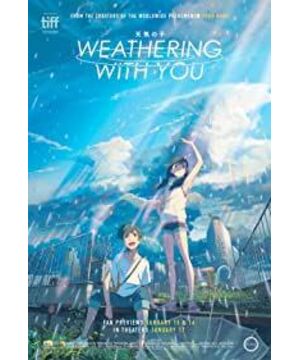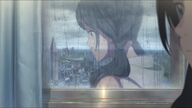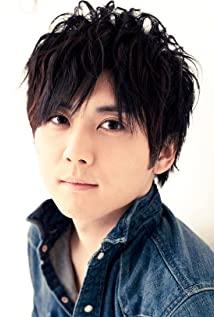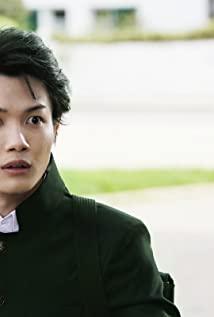This is not a film review, just want to talk a little bit about the advantages and disadvantages that I have seen.
Let's talk about the advantages first
1:. After the success of "Your Name", Xin Haicheng launched such a movie with a tendency to destroy the world, and he really dared to make it. And this kind of crazy romance that is extremely capricious and willing to give everything for love is still in line with my appetite. Such emotions are pure love.
2. There is no need to talk about the exquisite pictures of Xin Haicheng's movies as always. The heavy rain and sunshine in the city are really beautiful. It is worth mentioning that this time, Xin Haicheng also added a 3d effect to the fireworks section. The perfect match with the 2d painting is really impressive.
3 It is absolutely good to listen to RADWIMPS music alone.
Let's talk about shortcomings
1 There are many problems with the logic of the play, and many plots appear suddenly, without even a little foreshadowing. For example, why did the male protagonist run away from home, why did Keisuke take him in? What is the price of the female protagonist as Haruno, are not mentioned or mentioned in the second half of the film, which seems very different. It's natural. When everything has so many coincidences arranged together, this is the result of this touching love. In this way, emotions are intermittent and non-continuous.
2. There are very few characters appearing in the children of the weather this time, but there are still many characters for the sake of characters, and the chaotic situation of the characters exists. It can be said that, except for the hero and Keisuke, the other characters are all instrumentalists. As the younger brother of the heroine, Nai's greatest role is to sell cute and serve as the only designated spot for the film. Does this character have any role in the advancement of the plot? If necessary, come out to help a group of heroes; if it is a male The Lord and Keisuke correspond to each other, so what about him? There are two police officers, young and old, who appear for the first time in the middle of the film, and their characterization is also very simple, just to hunt down the male protagonist, without mentioning the characters. Any other emotions. When the young policeman appeared in front of the audience with exaggerated cow dung heads, the audience next to me called out "Hashibo Jousuke". Maybe the purpose of this role is to pay tribute to Jojo. In the second half, everyone's characters have become instrumental, the heroine lacks motivation and dedication, Natsumi appears at the police station for no reason, and Keisuke's help goes against the logic of the role even more. For Keisuke, his daughter is everything to him, and a rainy day is undoubtedly very dangerous for an asthma patient. It is really unreasonable for him to let the male lead take back the female lead and the rain. In this way, the gap between the roles and the lack of motivation has further compressed the emotional release.
3 Combining the above two points, the emotions emphasized in "Children of the Weather" are quite ineffective on our side. Coupled with some terrible and vulgar complexes, such as running along the railroad tracks, such as swearing, such as flashback, are full of the director's self-movement. Except for Secondary Two, I really don't know how to describe these bridges. I think Xin Haicheng must have noticed the problem with this script. The remedy he chose is to accumulate music and release emotions through mv. It's a pity that this kind of treatment not only didn't elevate the mood, but also weakened one's own expression because of the abruptness. When I saw the protagonist yelling, moved by myself and matched with beautiful and strong music, I really didn't know I should cry but laugh.
4 There is one more point. Although it is not a shortcoming, it is still a pity. In the foreshadowing of the first half of the movie, a scene of young people confronting society similar to "Youth in Youth" was constructed. They have no reliance, only themselves, and the care of them by adults is nothing more than thinking that they are good to them. Such a depiction can actually expose the shortcomings of the social system and strengthen the textual expression. However, Xin Haicheng did not do this. He chose to continue these cliché stories instead of focusing on the characters themselves. With the development of the plot, the story becomes more and more hollow. There are no clues and rely on the side to advance, and the boringness of the plot will have an even greater impact.
5 Finally, it is natural to mention the ending. The setting of destroying Tokyo is extreme and romantic, and it is not the same thing when it is executable. What Xin Haicheng has done here is still not decisive enough, and the sequel three years later is boring and powerless. Even if Tokyo is mostly flooded, people are still living normal lives, and the disaster seems to have no effect on them. In the end, Xin Haicheng obviously didn't know how to end this ending, so he asked the male and female protagonists to meet here on the slope like "Your Name", and then ended, full of perfunctory feeling. Don't continue writing, it feels better to stop on that majestic rainy day than it is now.
To sum up, Xin Haicheng’s emotional expression in this work is obviously out of balance. He wants to be “reflexive” and “change” at the same time because of various restrictions that make everything worse. Putting aside the exquisiteness of the picture, only the emptiness of the drama will be left behind.
View more about Weathering with You reviews











